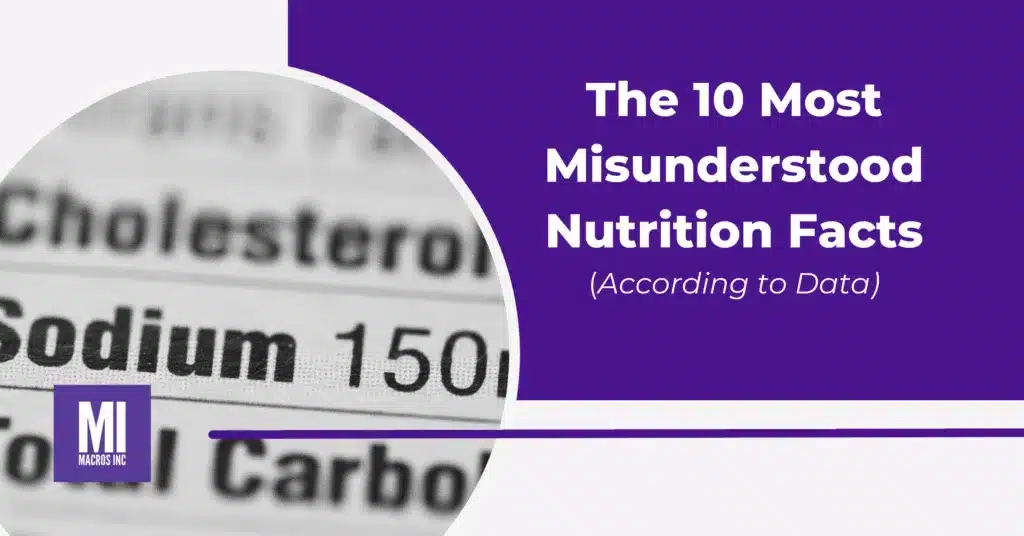When it comes to nutrition, misinformation spreads quickly. With so much data available, it’s easy for certain facts to get lost in translation or taken out of context. After analyzing a vast amount of nutritional data, we’ve identified the top 10 most misunderstood nutrition facts that people frequently get wrong.
Jump to a Topic
The 10 Most Misunderstood Nutrition Facts (According to Data)
1. The Most Current Evidence Suggests 1.2-2.4 Grams per Kilogram of Protein per Day
Many people underestimate how much protein they actually need. The latest research indicates that individuals should aim for 1.2 to 2.4 grams of protein per kilogram of body weight per day. This recommendation is particularly important for those who are active, as protein plays a crucial role in muscle repair and overall body function.
However, the general public often assumes they only need about 70% of this amount, leading to insufficient protein intake. This can result in slower muscle recovery, reduced muscle mass, and overall decreased metabolic efficiency.
2. Fructose is NOT Easily Converted to Body Fat
There is a common belief that consuming fructose (a sugar found in fruit and some sweeteners) leads directly to fat gain. However, fructose is actually not very efficiently converted into body fat under normal dietary conditions.
Studies show that when fructose is consumed in reasonable amounts, the liver primarily uses it for energy or converts it into glycogen (stored carbohydrates) before any fat synthesis occurs. The problem arises when excessive fructose is consumed in combination with a calorie surplus, leading to fat accumulation.
3. Physical Activity Decreases Significantly During Dieting, While BMR Remains Relatively Stable
A common misconception is that basal metabolic rate (BMR) drops drastically when dieting. In reality, BMR remains relatively stable, while non-exercise activity thermogenesis (NEAT)—the calories burned through daily movement such as walking, fidgeting, and standing—drops significantly.
This reduction in movement is an automatic response from the body to conserve energy, making weight loss slower than expected. Recognizing this pattern can help people consciously increase movement throughout the day to counteract the effect.
4. High-Intensity Exercise Relies Heavily on Muscle Glycogen
When exercising at above 65% of maximum intensity, the body primarily relies on muscle glycogen—not fat—as the primary fuel source. This is because high-intensity activities demand quick energy, and glycogen provides a rapid fuel source compared to fat, which takes longer to convert into usable energy.
This means that endurance and strength athletes should prioritize carbohydrate intake to replenish glycogen stores for better performance and recovery.
5. Being in Ketosis is NOT More Beneficial for Fat Loss
The ketogenic diet is often marketed as a superior approach to fat loss, but being in ketosis does not inherently lead to greater fat loss compared to a standard calorie deficit.
The reason many people lose weight on a ketogenic diet is that it naturally reduces calorie intake by increasing satiety. When calories are controlled, fat loss occurs at a similar rate regardless of whether ketosis is achieved or not.
6. The Body Does Not Use Fat Directly for Fuel
Contrary to popular belief, the body does not burn fat directly for energy. Instead, fat is broken down into Acetyl-CoA, which is then used in the Krebs cycle to produce ATP, the body’s energy currency.
This means that even though fat contributes to energy production, the process is complex and involves multiple steps. Simplified statements like “burning fat for energy” can be misleading.
7. Eating More Frequently Does Not Lead to More Weight Loss
A common myth suggests that eating small, frequent meals boosts metabolism and enhances fat loss. However, research consistently shows that meal frequency has little to no impact on overall weight loss.
Total calorie intake over the day is the key factor in weight management. Whether you eat three large meals or six smaller meals, the total amount of energy consumed and expended matters most.
8. Dietary Carbohydrates Have Little Effect on Cholesterol Levels
There is a widespread assumption that eating carbohydrates directly raises cholesterol levels, particularly LDL (bad cholesterol). However, carbohydrates themselves have a negligible impact on cholesterol unless they contribute to excessive weight gain or metabolic dysfunction.
Factors such as saturated fat intake, genetics, and overall diet composition play a far more significant role in cholesterol levels than carbohydrate intake alone.
9. Basal Metabolic Rate Does Not Predict Weight Gain or Loss
Many people believe that a “slow metabolism” is the reason for weight gain. However, BMR is not the main determinant of whether someone gains or loses weight.
Instead, weight changes are largely dictated by caloric intake and expenditure. Even individuals with a slightly lower BMR can lose weight effectively by adjusting their energy balance.
10. Lactic Acid is NOT the Primary Cause of Muscle Fatigue
For years, lactic acid has been blamed for muscle fatigue and soreness. However, recent research indicates that lactate itself is not the cause of fatigue. Instead, muscle fatigue is primarily due to the accumulation of hydrogen ions (H+), which leads to increased acidity in muscle tissue.
In fact, lactate can be recycled and used as a fuel source by the body, particularly in endurance athletes. This means that the body benefits from lactate production rather than suffering from it.
Final Thoughts
These ten misunderstood nutrition facts represent some of the most confusing aspects of dietary science. By understanding the real science behind these common misconceptions, you can make more informed decisions about your health and nutrition.
Rather than relying on outdated myths or misleading claims, focus on evidence-based principles that are supported by research. The more accurately we interpret nutritional data, the better we can optimize health, performance, and overall well-being.
Try our nutrition coaching, for free!
Be the next success story. Over 30,000 have trusted Macros Inc to transform their health.
Simply fill out the form below to start your 14-day risk-free journey. Let's achieve your goals together!

